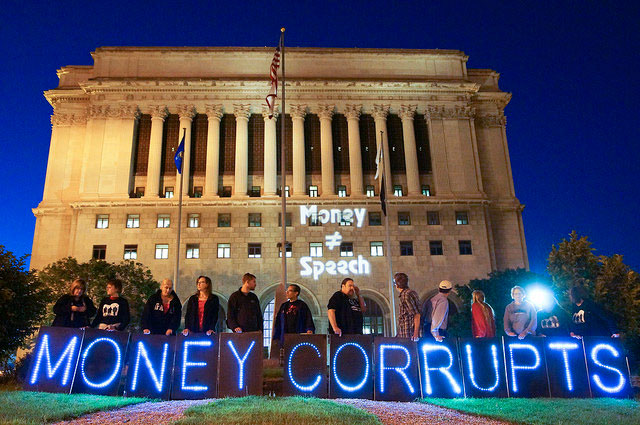
Support justice-driven, accurate and transparent news — make a quick donation to Truthout today!
On Sunday, thousands of activists from around the country arrived right here in Washington, DC, after a 10-day long, 140-mile march from Philadelphia.
The marchers are part of a movement called Democracy Spring and Democracy Awakening, and today they staged a sit-in at the Capitol building. They plan on camping out there through the end of the week.
All of this is part of a massive, nonviolent campaign to save our democracy from oligarchy.
See more news and opinion from Thom Hartmann at Truthout here.
Democracy Spring activists are calling on Congress to take action right now on a group of different bills that would take money out of politics once and for all.
Kai Newkirk, one of the organizers of the march, appeared on this program and told me about its goals.
The fight against corporate control over our democracy is, of course, the same fight that Bernie Sanders is fighting right now in his presidential campaign.
But it’s also the same fight that the founders fought more than 200 years ago when they rebelled against the British empire and created our constitutional republic.
They just called it something different — they called it the fight against “faction.”
James Madison, the author of the US Constitution, talked at length about the dangers of faction in “Federalist Paper Number 10.”
First defining faction as, “[A] number of citizens … who are united and … adverse to the rights of other citizens, or to the permanent and aggregate interests of the community,” he then warned that, “The instability, injustice, and confusion introduced [by faction] into the public councils, have, in truth, been the mortal diseases under which popular governments have everywhere perished.”
Many historians have interpreted Madison’s words as a warning about the dangers posed by political parties. And while that’s probably partially true, it’s not the whole story.
A faction, as Madison understood the term, was any special interest that was “adverse [in opposition to] to the… interests of the community.”
This could mean a political party that cared about its own success more than the success of the republic as a whole, but it could also mean a pressure group like the shipping industry or, to pick a more modern example, the fossil fuel industry.
This fear of faction was well-grounded in historical fact.
Madison was a student of history, and he didn’t want our fledgling republic to go down the road of ancient Rome and ancient Greece, which both collapsed after being taken over by powerful special interests.
He knew, as did the other founders, that if democracy had a fatal flaw, it was that it was susceptible to the influence of factions that could hijack public institutions and use them to their advantage.
This is why, of course, Madison and the other founders created this thing we call our government — to protect against the power of factions with laws and regulations.
Today, though, the founders’ worst fears have been realized and factions have taken control of our political system.
They’ve infiltrated and largely taken over our political parties, themselves a kind of faction, and divided themselves accordingly.
The National Rifle Association, the big banks and the fossil fuel industry control the Republican Party while Silicon Valley and the health insurance industry control the Democratic Party.
To make matters even worse, the Supreme Court and its Citizens United decision have given these factions free reign to spend as much as they want on our election process.
Just like the factions that Madison wrote about in “Federalist Number 10,” they can now manipulate public opinion to get what they want.
As President Carter pointed out on my show, this isn’t a democracy, it’s an oligarchy, and it’s the complete opposite of what this country was founded on.
That’s why movements like Democracy Spring and Democracy Awakening are so important.
They don’t just encourage young people to get active in politics, they also rejuvenate the ideals that made this country’s experiment in democracy possible in the first place.
Those ideals have never been more important — more and more under attack by factions — than they are today.
So let’s get behind movements like Democracy Spring and take back our democracy from the clutches of faction and oligarchy.
Media that fights fascism
Truthout is funded almost entirely by readers — that’s why we can speak truth to power and cut against the mainstream narrative. But independent journalists at Truthout face mounting political repression under Trump.
We rely on your support to survive McCarthyist censorship. Please make a tax-deductible one-time or monthly donation.